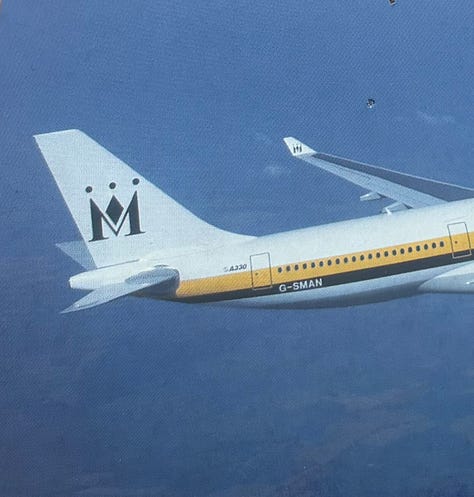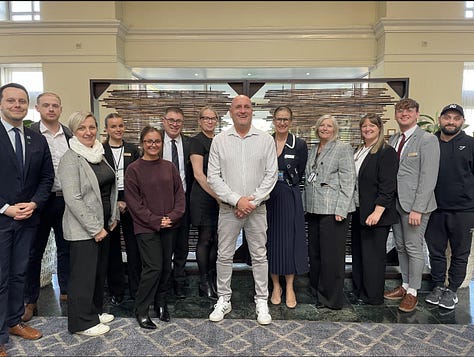April Spotlight... You, me & us
Mike Izzard: Mental Health First Aid Trainer, Former Cabin Crew, Husband & Dad.
Hi Hunni,
I’d like to introduce you to Mike Izzard, who has kindly offered to share his experience, how it shaped his past and present, and what he does now.
Mike joined Monarch Airlines in 1999 after roles within theatre management and sponsorship/marketing for Capital Radio. After 13 years as cabin crew at LGW, he moved into ground based role within Cabin Crew Performance Management at BHX & EMA. He helped set up the Monarch base at EMA & LBA, before moving to Eastern Airways based at Humberside as Head of Cabin Services in 2015.
After being made redundant in 2019, Mike decided to move away from aviation and set up his own training provider business MI Team Training, providing both physical and mental health first aid training.
In 2023 he launched The Sneaker Speaker to help businesses across the UK manage stress. He is writing a book to accompany the Managing Stress sessions he has so far delivered. His clients include: NHS, Hilton & Newrest.
Mike lives in Cheshire - a married dad of 3 amazing children and a lifelong Man Utd supporter!






1/ Mike, why do you feel it’s important to talk about our mental health?
“The biggest barrier to discussing Mental Health is the stigma that is associated with MH conditions. Simply by talking about our own MH we can break that stigma and others are therefore far more likely to reach out for help.”
We all have Mental Health - how you manage it is the important factor, and as a society we need to appreciate that someone who is experiencing poor MH is not inferior in any way, and can benefit from any support available.
2/ In your experience of flying, did you feel confident you could seek help from your airline if you needed it?
During my flying days 1999-2012 MH simply wasn't discussed in the workplace.
I have no doubt that support would have been forthcoming, but it certainly wasn't something that was advertised as available. Traditionally, and sadly, statistically males do not discuss health (either physical or Mental) and lack of open conversation is also a generational issue with older generations unlikely to open up.
3/ What were your biggest mental health stressors when you were flying?
“For me personally I found the stress of trying to balance work and family very difficult. As a parent I wanted to be ever-present for my children as they transitioned into schooling and needed parental support - often I was away on long haul trips and felt "guilt" due to not being present at home.”
Whilst I loved the flying role the physical strain of the cabin crew job/different time zones/shift patterns brought with it Mental Health stress.
“I also believe that whilst appearing to be glamorous to outsiders, long haul flying brings with it a danger of social isolation which can certainly add to stress levels.”
4/ How have you developed your career outside of flying? Was it easy to adjust?
If I'm honest I was kind of forced into a change due to redundancy but once I decided to launch my own business in the training field I embraced it. I used the pandemic lockdown to complete my teaching qualifications and design logo/website etc so that when the world reopened I was ready to launch.
“My wife (ex cabin crew) also launched a travel agency business the month before the pandemic closed opportunities to travel so we had a high degree of stress within our house as we attempted to get 2 businesses up and running!”
It has undoubtedly been hard work but I have been determined to make a success of life after aviation. I have received a lot of support and advice from ex colleagues - further demonstrating to me that the aviation world is a close knit community that wants to support and inspire each other.
5/ Any other experiences within aviation, or outside relating to mental health you would like to share?
I come from an aviation family. My late father was an RAF & civilian pilot, my sister was cabin crew at Monarch, and therefore I have witnessed the stress that such roles can bring to a family. Whilst there are undoubted rewards, I saw the stress my mum experienced as a result of Dad being away for large periods of time.
“Aviation roles can add to the stresses that already exist within relationships - whether those relationships are with a partner, children or indeed friends.”
Personally my passion for raising MH awareness was as a result of a series of life events I experienced in 2019. The aforementioned redundancy happened very quickly and I found myself losing a good income and company car along with a role that I enjoyed. This happened at the same time as my wife and I were expecting our first child together - at a time where I wanted to be dedicating all my time to supporting my wife, I was dealing with my own redundancy.
Within a few months of being made redundant and the arrival of our little boy I was diagnosed with thyroid cancer. My world had literally fallen apart in a matter of months; no job, financial worries, needing to find a new job and now being told that I would need to dedicate the next 4 months to a series of treatments for my cancer.
“I found myself feeling depressed and anxious about the future - I found myself withdrawing from hobbies - I found myself not wanting to leave the house - I found myself crying in the shower because I didn't want others to witness my sadness. I found myself dealing with Mental Health in a way I hadn't experienced before.
Mental Health & wellbeing can very quickly deteriorate and it doesn't discriminate - it can happen at any time to anyone.”
6/ Thinking about Mental Health, what do you wish you had known before you started flying?
Everything! I was guilty of a mistake most people make - unless poor MH affects you or a family member we tend to not educate ourselves in it.
“I only invested my time and energy in my Mental Health when it fell below the level it needed to be at - had I been more proactive I may have dealt with it differently.”
If we are better educated on Mental Health it also arms us with the skills to support others as well as ourselves.
7/ What advice would you give to future and existing cabin crew?
Try and engage in Mental Health. We tend to spend far more time on protecting our physical health, which is important, but there are definite links between MH and physical health. To have some understanding of how to utilise self care, how to manage our stress, and how to identify when others may be struggling is invaluable.
“Self care is critical.”
A good sleep pattern (not easy when working in aviation), a good diet (not easy when working in aviation), engage with others socially, connect with nature and be mindful of your environment. Please allocate the same time and resources to your MH as you do for your physical health.
8/ Any tips that you use personally to help destress and move aware from a negative thought process?
My book "Protect your Pan" will hopefully be published in the future and will contain my strategy for managing your stress! Without wanting to spoil any surprises it centres around our "Saucepan of Stress" which you, and others, carry around with us every day.
“Stress - whether work, home, financial or health related - is more and more water added to your boiling saucepan. We need to control the water levels before we get to a point where the saucepan is boiling over - a MH crisis.”
There are a number of ways which I suggest you can do this. All will be revealed!
Huge thanks to Mike for sharing his experiences with us. If you would like to be featured, just send me a message on LI Charlotte Crocker or IG
See you in May!
Charlotte
XoX
If you need to reach out, most airlines offer extensive help via their wellbeing zones/hubs, or if you want help not associated with work, use any of the following:
The Samaritans: 116 123
Text SHOUT to 85258
Crisis Textline: Text HOME to 741741 (UK, Ireland, US and Canada).



